
I launched my first Authority Website in March 2000.
Although, I did not know it was an authority website.
Back then, we called them Portals.
Today authority websites are considered trusted, reliable sources of information.
That is what every blogger and online entrepreneur wants to create.
Website visitors are delighted when they find an Authority Site.
They have found a reliable resource they can trust.
They have found what they were looking for!

The Authority Site Launch Process
![]()
Free PDF Report

This post is longer than most. For those who prefer to read offline, we have made this post available as a PDF Report.
We have built and sold multiple authority websites. We tell you how it is! This is essential reading if you want to turn your humble blog or website into an authority website.
To request your free copy, CLICK HERE.
![]()
4 Things You Must Understand Before We Start.
#1: Focus is critical
When launching an authority website, there are some things that matter more than others.
Get those right and your chances of building an authority site multiply!
With Authority Websites, as in life itself, the 80/20 rule applies!
[approximately 80% of results come from 20% of your activity]
Understand which 20% of activity to focus on and your chances of success increase.
Don’t get caught up in things that don’t move the needle much.
Ask yourself, is this the most important thing I should do be doing right now?
#2: Invest in Authority Website training
We recommend investing in an Authority Site training program.
This is the only External Training we recommend.
Some authority website owners want to supplement or match their current income.
Others are looking for a six-figure income and a 7 figure exit.
Whatever your ambitions, you will need to invest time to obtain the necessary skills.
Investing in this training will save you time and money – meaning you reach your goals faster.
Creating an authority website is not a get-rich-quick scheme.
It is more a Get Rich in 12–24 months scheme, provided you put in the effort.
If funds are low, do at least attend their Free Webinar.
[You will learn more from this webinar than many paid courses]
#3: Start now, get perfect later!
I am a bit of a perfectionist.
I edit a post multiple times before pressing publish.
Don’t be like me! (at least, not to start with)
When launching your first Authority Website, my advice is: get started now, get perfect later. Tweet This
Sometimes the best thing to do is to get those words on the page and click publish. You can fix those grammatical errors later when you get some traction.
If you’re waiting until you feel talented enough to make it, you’ll never make it.
We will cover this later when we discuss scaling content publication and the pros and cons of hiring writers.
Note: To make things easier for yourself we recommend using NameCheap for domain names and Hostgator or BlueHost for hosting.
#4: It takes dedication!
20 years have passed I launched my first Authority Website.
But the fundamentals have not changed!
To create an Authority Website requires either:
-> extreme dedication as a content creator.
OR
-> significant investment in content creation.
Sometimes, both!
Assuming you don’t have significant funds to invest, here are two things you need to know:
-> Be prepared to publish content for many months before seeing any significant rewards.
-> Only the best content (writing, videos, graphics) will do.
You can’t rattle off a blog post in 30 minutes and expect huge success.
It can take many hours, even days, and sometimes weeks to write a stellar blog post that attracts back-links and gets shared.
I am told the average novel of 90000 words takes 180 days (6 months) to write, assuming you write 500 words per day.
Some of you are saying “I can write over 500 words per day”.
Perhaps you can.
My point is: “can you write 500 words of exceptional content – every day?”
What is an Authority Website?
In simple terms, an authority website or blog is a popular online place where people go to for information on a particular niche or topic.
Authority sites are websites that get bookmarked and widely shared. When a visitor lands on an authority site they get excited – at last they have found what they are looking for!
An authority website is a trusted, reliable source of information.
Tweet This
An Authority Website is one of the best and least expensive ways to create a substantial six-figure income.
My first authority site was in a home improvement niche.
We became the PREMIER online place for people interested in that niche. (more on that later)
How Do I Make Money With An Authority Website?
There are many ways you can make money with an authority website.
Here are the four main ways:
- Consultancy or business services revenues-my friend Clinton Lee is an example of this.
- Lead Generation (this is what I did)
- Launch an Information website and follow that up with your own range of information products. Joshua Dunlop and his site Expert Photography is an example of this.
- Promote or sell other people’s products as an affiliate. (this website generates most of its income that way)
The fourth option is the most popular and the easiest to implement for new Authority Website developers.
With this approach, the offers you are promoting will have been tested.
The copy will have been written and conversion rate optimization will be in place.
Having a sales page that converts is essential.
Note: Before promoting, find out the EPC (earnings per click) of the offer you plan to promote. That will be a good indication of how successful the offer is.
We can also combine option four with option three. For example, as an Amazon Affiliate besides selling your own products.
Some words of caution…
When building an Authority Site that makes most of its income from affiliate relationships, don’t put all your eggs in one basket. If you are in the camping niche, for example, it would be unwise to rely exclusively on Amazon for your income.
Amazon or any retailer can change the commission structure or close their affiliate program. As an example, Amazon recently reduced the commissions they pay.
Spread the risk and promote products from alternative merchants or, if you get enough traffic, sign-up with advertising networks such as Google AdSense or Bidvertiser.
To be clear, I like Amazon a lot and I have been a small Amazon affiliate for almost 20 years.
[Related Article: How To Increase Your Google AdSense Earnings]
The Good News About Launching An Authority Website Today
There is less competition than you think.
Not everyone will agree, but bear me out.
Of the people who launch an authority site, only a small number stick with it and bring their dream to a reality.
I don’t say this to discourage you. I say it because most people are lazy and are not prepared to do the work needed to make their website a success.
They are not prepared to create and publish top-quality content, month after month, and many (most) give up before the big payday!

Many website owners start out strong and full of optimism but give up a few months later.
Optimism is good, but optimism combined with resilience, realism, and determination is what you need to succeed in life and business.
16 Things YOU Can Do To Turn An Ordinary Blog Into An Authority Website
No1: Select a Profitable Niche For Your Authority Website
Authority Website experts will tell you to use tools like ahrefs or SEMRush to find that magical niche with lots of traffic and low competition. (These tools are also used for backlinks and SEO analysis)
It is good advice, but it is only one consideration.
It is also important to select a niche; you have a passion for.
A competitive niche, that interests you and inspires you, is a better choice than a niche with low competition. (that doesn’t inspire you)
If you will spend a lot of time building an Authority Website, your chances of success are greater if you are writing about something you have a passion for.
There will be days when you won’t feel like writing. If you are passionate about the niche, there will be fewer days like that.
Pick the wrong niche and it will feel you are pushing water uphill.
Want ideas for selecting a niche?
Check out this post by our friend Pat Flynn — Tips to Help You Pick a Niche
One “old school” way I used to find niche ideas is to review the magazine rack on a large newsstand. Publishers spend a lot of money researching demand before publishing a magazine and the chances are high that if there is a magazine for the niche it is profitable and worth investigating.
Authority Website Success Story
Wirecutter (which focuses on electronics, home goods, and tools reviews) is often mentioned as an Authority Website success story.

The Wirecutter was founded by Brian Lam in 2011 and purchased by The New York Times Company in 2016 for about $30 million. In the five years from its launch in 2011 to 2016, the company generated $150 million in revenue from affiliate programs.
Let’s be realistic, the chances of you and I creating another WIRECUTTER are not high.
To start with, Wirecutter required significant investment (as of 2018 they had 100 employees).
That is why I recommend you select a NICHE or sub-niche within a larger niche as your target market. (rather than have a broad approach)
Related: How to get an unlimited supply of good business ideas.
No2: Find the Perfect Domain Name for your Authority Site
Assuming you are starting an authority website from scratch.
You should try to secure a .com or, at a stretch, a country domain extension such as .au or .co.uk
The most important thing is to get started.
Many people spend too long trying to find the perfect domain, rather than get started.
Let’s face it, Wirecutter would not have been the obvious name to choose if your target market is electronics, home goods, and tools reviews. (and it didn’t hold them back)
That said, if you can find a keyword-rich domain that suits your niche, then so much the better.
Quick Domain Selecting Tip:
Try adding words like Tips, Hacks and Facts to a keyword.
This often results in a brand-able domain name.
For example Entrepreneurshipfacts.com
As I write: AuthorityWebsiteFacts is available as a .com
If your niche was “Authority Website” that may be the domain for you.
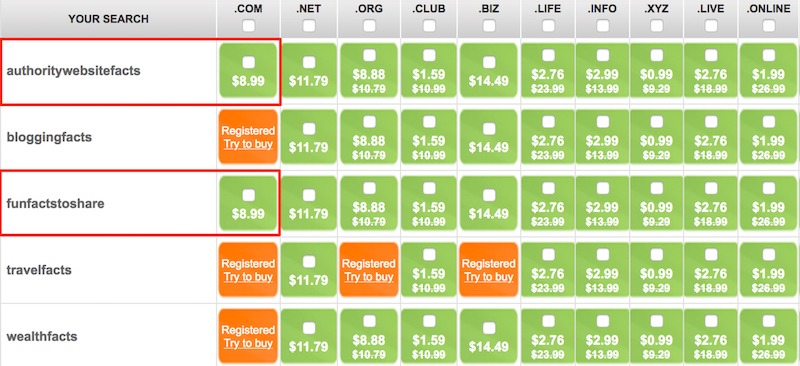
According to ahrefs.com “Authority Websites” registers a Keyword difficulty of 52 (out of 100) which means it is a Hard Keyword to rank for – despite the fact, its Global search volume is indicated at only 260

In the above example, it surprised that all the extensions for FunFactsToShare including the important .com are available.
At ahrefs.com FunFactsToShare registers a Keyword difficulty of 31 (out of 100) which means it is a hard keyword to rank for – with a Global search volume indicated at 2100 per month.
FunFactsToShare is a good example of a Key Phrase that in theory looks good. It is brand-able, great for social media, great for shares, and with some content marketing likely to produce a lot of traffic.
However, there is an important question you need to ask….
Can you make money in this niche?
Traffic that you can’t monetize is almost worthless. [see our case study in section 7]
Less traffic in the right niche will financially outperform high levels of traffic in the wrong niche.
[Not that large volumes of traffic can’t be monetized.]
Two more ideas on selecting a Domain Name…
=> Be creative, think outside the box
Take for example Retireat21.com – a site that originally targeted the Young Entrepreneur niche and founded by Michael Dunlop (who also founded this website). Michael sold Retireat21 some years ago – one of several authority website exits for him.
“Retire At 21” may not automatically make you think Young Entrepreneur, but it makes people curious and turned out to be an almost perfect domain for the young entrepreneur niche, ranking No1 in Google for “young entrepreneur” at one time.
=> Buy an existing domain
When Joshua Dunlop entered the photography niche, he bought ExpertPhotography.com for $2000 from a domain investor. A significant investment at the time. It turned out to be one of his best business decisions.
In my own case, a domain investor had registered the primary keyword for the niche I was involved in, way back in 1996 and it was not available to register. However, after some negotiations, I managed to secure it in 2003 for a $5000 investment.
While I considered that a lot of money owning that Domain name added to my “Authority” and was a contributing factor in the successful exit in 2006. Owning the “keyword DOT com” domain is one of my personal secrets for increasing website value.
Sedo.com claim to have the best domains for the brightest of ideas. I have used them several times to buy domains. I have also sold domains using their brokers.
![]()
Looking for a step-by-step process for creating Authority blogs and websites?
Want the “secret sauce” that takes your blogging to the next level?
(and allows you to give up the day job)
Then this is the one course you SHOULD own!

There is no better. No BS.
Just facts and a roadmap THAT WORKS.
It’s simply the best…
![]()
No3: SEO and keyword research

For SEO and keyword research we recommend using SEMRush
As mentioned, don’t build your authority site around a random topic that you have no interest in, just because there appears to be little competition. (there are usually good reasons for low competition)
Important!
=> You should define your audience therefore your target keywords.
=> Once you define your keywords, you need to divide them into 3 different groups.
- Easy to rank keywords
- Keywords you may rank for with some effort.
- Keywords you cannot rank for (at least at the beginning)
I would recommend you start with easy-to-rank keywords. This will bring some immediate traffic to your site, although there will not be much volume. Think of it as getting your website warmed up with the search engines.
Later (3 – 6 months) you can focus on keywords that are more challenging to rank for. This will bring a larger audience.
Later still, especially after you have built up some backlinks, you can target more difficult keywords that can bring the most volume of visitors to your site.
The above is a suggestion, not a rule. You can target keywords of any difficulty, at any time.
However, I have found that using this approach to start with will give you some early wins and encouragement, which is essential. Read more about keyword research and other tools you can use here.
More SEO Resources:
=> This PDF report provides some fresh ideas. [no opt-in required]
=> Google’s Webmaster Guidelines. [essential reading]
=> 10 SEO Blog Post Publishing Steps that Most Bloggers Forget
=> 25 Best SEO Tools For Successful Blogging
=> Link Building – Without The SEO Risks
=> SEO Mistakes you must avoid.
No 4: Only publish quality content

The Essentials Of Authority Site Content Creation
With WordPress claiming that 409 million people view over 20 billion pages each month…
Whatever you write, better stand out!
Visitors will quickly leave your page if you cannot engage them, or get their attention.
It is my experience that the more quality content you publish, the more authority your site develops.
In particular, the more content you publish around a topic, the greater the topical cluster you create and the more likely the search engines will take you seriously.
If you have a small website with a section about “beach decor” you can only cover a relatively limited amount of topics like “beach decor ideas” and “bedroom beach decor”. However, if you have a larger site, you can approach the same topic from different angles. Examples: “Christmas beach decor”, “vintage beach decor” or “rustic beach decor”.
The more content you create around the long tail variations of your main keyword, the more authoritative your website has for your short tail keyword.
Every post you write in your blog should be reliable, easy to understand, and shareable. When people read your posts they should not be bored. Your expertise and experience should shine through.
Quality content comes in lots of different formats. Use blog posts, tutorials, videos, podcasts, reports, resource pages, reviews, and listicles to show your expertise. The more versatility there is in the content you produce, the more likely you will become an authority.
=> One skill all Authority Site Owners must perfect is: Copywriting. Get our free copywriting course here.
=> Tips for people who think they can’t write
=> How I Get Blog Post Ideas
=> Blog Tracking Tools – Blog Analytics
=> Best Keyword Research Tools
A simple, easy to remember formula for writing content Google likes…
When creating website content use the E-A-T formula.
Expertise, authority, and trust. [EAT]
All content you write should build on your expertise, authority, and trustworthiness.
Do this and your website to stand out from the crowd.
Learn more about E-A-T in this Medium post or watch this excellent YouTube video.
How many words should an Authority Blog post have?
The more the better, but there is a caveat.
Your content must engage, entertain and educate. (the 3 E’s)
If it is none of those, don’t bother.
Two other things to consider…
1) Websites like Facebook and Instagram have reduced the attention span of visitors.
2) Most people will visit your site using a mobile device.
If you have a long post (2000 words plus), chances are high that most people will scan it first, read the headlines etc and only then decide if it is worth taking the time to read the complete article.
If I am pushed to quote a number, I usually say 1500 words although personally, I aim for between 2000 and 2500 words and the occasional mega-post, like this one – which ranks well for “write a best seller“
It is my experience that the longer the article, the more chance it has of ranking in first-page search results.
There be exceptions, especially for review sites and travel lists.
I am told…
=> That posts with over 2000 words receive the most social shares.
=> The average word length for an article found in the first 5 positions in Google is around 1800 words.
That said, one of our highest-earning blog posts is well under the recommended 1500 minimum.
Read more about that particular blog post in step 7 – Case Study below.
What about hiring content creators for your Authority Site?
With most start-up authority sites, you will initially do the bulk of the writing and content creation yourself. Eventually, with some success, you may wish to consider hiring content creators.
This is something we have done ourselves in the past, with mixed success. Here is one of the better writers we hired.
Finding good writers who can write in your preferred voice is more difficult than most people appreciate. It is also more expensive than most people realize.
Sure there are writers who will do 5 blog posts for $100 – but most, if not all, are rubbish, often created using article spinner software. Article spinning often results in articles that are hard or even impossible to read. It creates a terrible reader experience and you should not do it.
It is my experience that the least you can pay for a somewhat decent article (that you will almost certainly have to tweak yourself) is $60.
In reality, for a high-quality writer you will need to pay $200 – $500 for longer, better-researched posts.
Not everyone agrees with me, but that is my experience.
It is my experience, that it is better to pay $2000 for 10 outstanding articles that engage your readers than to spend $2000 for 40 articles that bore your readers and don’t get read.
That said, there are some other alternatives you can consider… especially if you are implementing a “start now, get perfect later” strategy.
Again with caveats.
Content creation on a budget
“I’m a start-up Barry, I can’t afford $250 + per article”
I hear you. You are not alone. There are other alternatives, but they come with a caveat or two.
If your budget is low, you can try FIVERR – (1000 word articles for $10). They do however offer a more expensive verified Pro service.
Arguably a better budget alternative is TEXTBROKER – they offer 4 Star Writers from 2.7 cents per word. On the few occasions I have used services like this, I have found they work best for Listicles aka “list posts” rather than in-depth articles that require a lot of research. Be prepared to do some tweaking and editing yourself, before publishing.
Although, if you are implementing the Start Now, Get Perfect Later rule to scale as fast as possible, I accept there may be merit in getting the content out there and seeing what traction you get.
A 60,000-word website – is a reasonable initial goal for an authority website. To achieve this you need 40 articles assuming an average article length of 1500 words.

TestBroker has a nifty tool that allows you to calculate the cost of hiring a writer. In the example below, you can hire a 4 Star writer to complete a 2500 word article for $67.90.

If you want a 5 Star writer, that would increase to $180.40.
Budget permitting, you can also consider the Textbroker Managed Service, which allows you to outsource your entire content project for as little as $2,500.
Content I Will Not Publish On My Authority Website
As a quick example of the content I will not publish, today I received a guest post submission for another website I manage. (in the catering niche)
The title of the article was: “Your Cheat Sheet for Putting up a Café”
Now, you might think that sounds interesting and would be full of interesting content?
It wasn’t!
It was bland and generic content. [e.g. research, build a business plan, choose a location blah, blah]
It was easy to reject, simply because it didn’t pass my first test for content I publish, which is:
“Will this content be of value to my reader” or “will my reader thank me for this content?”
No reader will thank you for BLAND content.
Despite what some Authority Website Gurus may tell you, it is better to publish less high-quality content than numerous bland and uninteresting articles that no one reads.
The Truth About Being A Writer (or any type of content creator)
One of my favorite books on writing is “First you write a sentence“. The author Joe Moran is a remarkable writer and the first paragraph sums up being a writer better than any words I can use.

I relate to deleting the writing and starting all over.
I do that a lot.
Of course the same applies to any type of content creator – video blogger, infographic creator, podcaster, etc. There will be days when the creative juices are just not there. That is when you delete the lot and start all over.
Related: How To Create Viral Content Your Readers Will Love
One final, but important point:
Separate the processes of creation from improving.
This is not a fresh idea, you probably have heard it before. However, Kevin Kelly’s pithy description is the best I have come across.
You can’t write and edit, or sculpt and polish, or make and analyze at the same time. If you do, the editor stops the creator.
While you invent, don’t select. While you sketch, don’t inspect. While you write the first draft, don’t reflect. At the start, the creator mind must be unleashed from judgement.
No5: Improve website design – Get a Premium Theme

An authority site doesn’t have to look fancy.
However, if your website has an unprofessional look, people will not stay around. Your site should be an easy-to-use website that provides a great user experience.
Top Tip:
Invest in a premium theme that presents your brand in the best light.
Free themes are great for starting out, but most cannot be properly customized.
First impressions count!
Recommended Article: 15 Best Practices for Responsible Responsive Web Design
No6 Branding Your Website
Some of these suggestions are more important than others.
For example, having a memorable logo is more important than sorting out your favicon.
Back in 2000, I had this logo created. I am not suggesting it has passed the test of time, but it worked exceptionally well. It was brand-able, worked well on t-shirts, polo-shirts, etc and the logo helped set my site aside as an authority website.
You should also secure all the main social media channels for your brand. (LinkedIn, Facebook, Pinterest, and Twitter at a minimum) Namecheckr.com is great for checking if your brand name is available for a particular social media channel.
You should link to all your social media accounts from your website and vice versa.
Anytime you publish a new piece of content, syndicate your content on these social platforms. If you have time and resources, spend some time each week responding to people’s questions and interacting on these social accounts.
Special Note: Don’t buy social signals.
[Social signals refer to a webpage’s collective shares, likes and overall social media visibility as perceived by search engines.]
Google is skilled in understanding if a site has the authority or faking it. Fake it till you make it, doesn’t apply here.
Use memorable color schemes on your site that represent your overall brand image. This will help when your website becomes the authority website in your niche, people will recognize it from its look.
If you have a local business site, it is always a good idea to register with local directory sites like Yellow Pages and Yelp.
![]()
Free PDF Report

This article is longer than usual. For those who prefer to read offline, we have made this post available as a PDF Report. Essential reading for anyone who is serious about turning their humble blog into an authority website.
To request your free copy CLICK HERE.
![]()
No7 Host case studies & do market-leading research
This is the fast track to building an authority site. It requires time and investment, but it is one of the best ways to stand out from your competition and be recognized as an Authority.
When you provide well-researched information people will talk about your research. They will link to your site, and share your content on social media.
Not every case study needs to be an academic style case study. It could be a simple comparison of strategies in your niche or a short case study such as we have published below.
A Word Doc that you “jazzed up” and made into a simple PDF like this will work.
![]()
IncomeDiary Case Study: Article Length, Keyword Rankings and Earnings
A comparison of two of our most popular pages.
At IncomeDiary, we have had our share of Blog Post winners and losers.
Some posts take off and get huge amounts of traffic.
Some posts that for whatever reason didn’t go anywhere.
That is why from time to time we delete those blog posts (which surprises people).
For this case study, we compared two of our most popular blog posts in terms of rankings, traffic, and financial performance.
First, let us compare one of our epic Blog Posts… a blog post with over 10000 words.

According to Ahrefs, this page ranks for over 1500 keywords (within the top 100 search results) including 26 No 1 positions.
This blog post is averaging 449 page views per day.
Of the external sites that link to this blog post, 4 have a DR (Domain rating) above 70 and there is one above 80.
Domain Rating (DR) shows the strength of a website’s backlink profile compared to the others in our database on a 100-point scale.
[The higher the DR, the better]
I don’t tell you this to impress you.
You see this post despite the traffic it gets, has never made us a lot of money.
It makes a little, but not as much as you might imagine.
On the other hand – one of our best-earning posts has less than the 1500 minimum words we recommend.
(a good bit less)
According to Ahrefs, that post has over 2100 keywords ranking within the top 100 search results.
Including 14 No 1 results.
This blog post is averaging 308 page views per day.
Of the external sites that link to this blog post:
7 have a DR (Domain Rating) above 70.
3 have a DR above 80.
1 has a DR above 90!
All from a Blog Post with less than 1500 words!
Related: How to find out how much traffic a website gets.
The BIG TAKEAWAY for Authority Websites!
I have previously emphasized that the longer the blog post, the more likely it will rank well.
I have not changed my mind.
It remains a fact, despite the occasional exception to the “rule”.
The Big Takeaway is that in both instances, we are reaching people who are actively searching for information on these topics.
Especially well written and interesting content!
Hence the importance of keyword research.
The other, Big Takeaway: Not all traffic is equal when it comes to making money.
You will hit the occasional Home Run with traffic – but not every Home Run pays the same!
But you knew that already?
I would also add that it is not necessary for every blog post to be a money post.
There is value in publishing content that people find useful and enjoy reading. (It is good to give back)
I any case, good content will attract link-backs and that is good for SEO.
The occasional shorter post is fine.
Don’t be afraid to mix up the length of your content, especially if it is content that doesn’t lend itself to a more in-depth approach.
![]()
No8 Publish Expert Round-Up posts
An expert roundup post is a blog post that features contributions from multiple experts.
Typically, you the host blogger will raise a question or topic for discussion with various experts who share their insights.
The great thing about this is that the guests will usually link to your round-up article and share it on social media. [Traffic]
People like to be flattered and earn backlinks.
Although a roundup post can take quite a lot of effort, it can create massive exposure for your site that validates your website and builds brand awareness. It also brings you traffic you would not otherwise get.
Here is an example of one of our earliest round-up posts. It was a hybrid post that included the views of some bloggers we knew personally combined with the thoughts of various business leaders on the subject of hiring a virtual assistant.
We published that post on Aug 3, 2012, and all these years later it still brings us good traffic.
Related:
101 “B.S. FREE” Ways to Drive More Traffic To Your Website
Related: Why you have not yet become an authority in your niche
No9 Contribute content as a Guest Blogger
This is a popular way to get backlinks for your website
Guest blogging on high authority websites is very effective for building your authority and growing your readership.
To implement guest posting as a way of establishing authority, you need to find authority sites in your niche. You can make Google search by using Google’s advanced search operators, and/or use SEO tools like SEMRUSH.
Alternatively, you can search the names of Influencers in your niche and contact them. Keep in mind that when you are just starting out, many website owners will be reluctant to provide you a guest posting opportunity. In that case, you should write the article in advance (google docs is good for this) and circulate to several Influencers and see who is first to say yes. Your writing needs to stand out!
How To Request A Guest Post Proposal On An Authority Site
If you hope to have any chance of having your request for a guest post accepted, please take the time to write a detailed email explaining why I should consider you.
That includes examples of previous writing and a “pitch” for why your idea for a blog post will be of value to me. Ideally, it should include examples of other authority websites you have written for.
Below is an example of someone who has the approach I prefer.
I like the “How You Can Benefit” approach.
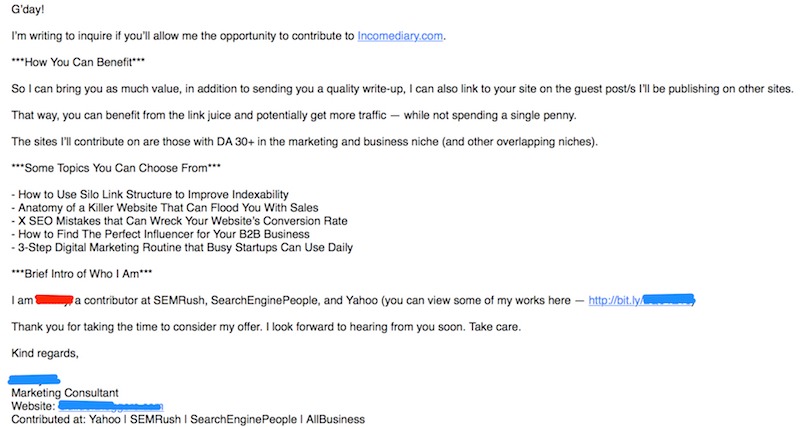
DON’T DO This When Requesting A Guest Post On An Authority Website
I get a lot of requests for guest posts, often over 100 per week.
Some ask if they can pay to have a guest post published (see below)
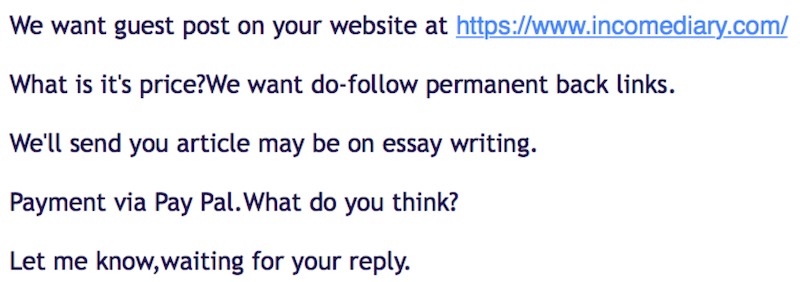
We do not accept payment for guest posts. Few Authority Websites, in my experience, will sell you a link or accept payment for a guest post.
There are two reasons for this:
1) Google does not like it and let’s face it, we don’t want to get the wrong side of Google.
2) As an authority website owner, your first question should always be, does this content add value to my website and readers? If it does not, then you shouldn’t publish it (no matter how attractive the payment is). Likewise, if the content is good and adds value, you will be happy to publish it for free.
=> Don’t believe everything a Guest Writer says…
Many guest post writers will tell us how much experience they have and how great their writing is. (not)
Many use a cookie-cutter / template approach. Many don’t give examples of their previous writing. See the example below:
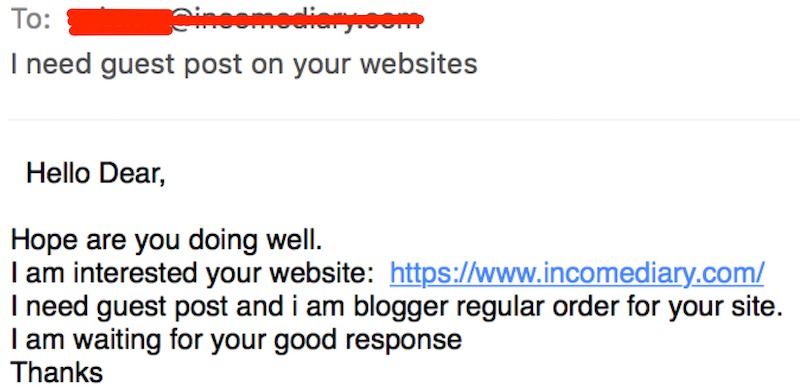
=> How to quickly check an article for Grammatical Errors?
ProWritingAid is our recommended App for quickly checking the quality of our own writing and that of external writers.
Their free plan, which covers basic writing corrections, works well for new bloggers starting out.

No 10 Post content to forums
But don’t spam!
Answer questions on websites like Quora. Link to your own website in answers but appreciate that in most instances and link you get will be NOFOLLOW. You are not there to spam; you are there to add value and help people.
That is how you become an authority.
Here are some reasons why you should post on forums and Q&A sites like Quora.
a) People on those platforms are actively seeking solutions to their problems. (Additionally, often their question will give you an idea for a future article)
b) They are looking for expert advice.
If you can spend even a small-time every week consistently responding to other people’s questions, you will establish authority.
If you provide genuinely helpful responses, you can refer people to your site and have referral traffic from those platforms.
However, the real benefit doesn’t come from the referral traffic you will get, but the user signals those sites pass to Google.
Go to Reddit and find subreddits related to your niche. Interact with other people and respond to their questions. Without spamming, leave a link to a relevant page in the discussion. Most forums are very sensitive to spam, and if you don’t provide any value but appear to only do self-promotion, you will find yourself kicked off the site.
No 11 Create a valuable report and give it away for free
I am not talking about a lead magnet.
We are talking about something like this guide from my friend Clinton Lee (Expert on UK Business Brokers)
This is something that is genuinely free. There is no requirement to provide an email address and anyone can share this document with no edits or changes.
As you can imagine, it gets shared and attracts a lot of visitors and potential clients to Clinton and his business.
Clinton’s guide is a bit tongue in cheek, which adds to the “share-ability”.
What can you give away that visitors would appreciate and share?
No 12 Implement Social Media Marketing
Social media provides abundant opportunities to connect with other people and influencers within your niche. This means you can easily exchange knowledge with a broad audience and engage with that audience further. It is also one of the best shortcuts promoting expert knowledge.
Search engines use social signals and other user behavioral metrics to determine the relevance of a page to a search query. The thinking is that the more content is shared, liked, and commented on, then the higher its quality, value, relevance, and ranking in SERPs.
You can check domain & social username availability across multiple networks use namecheckr
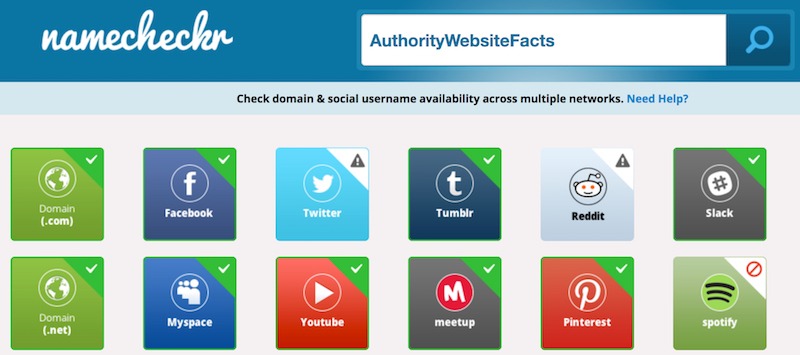
No 13 Host an Online Conference or Sponsor an Event
My first authority website was in a home improvement niche – focused on sun-rooms, conservatories and garden-rooms.
As our authority grew we got many media mentions and also ended up being a Key Sponsor of a competition to select the Best Conservatory / Sun-room installation.
This proved a great way to connect with leading industry players. It was also a great way to find more customers for my online lead generation service.
Interestingly, one of the people I connected with, ended up leading the team that bought my entire suite of Home Improvement Authority Sites in 2006.
Special Note: This post is also available as a PDF Report. Request your copy HERE
No 14 Develop and Host a Podcast
There is no rule that says quality content should only comprise text and images.
You can use podcasting to open the gates of whole new opportunities for your site. A podcast will allow you to reach a whole new sub-set of your market that prefers to connect with your brand via audio.
Inviting experts from your niche to be your guests. This can quickly set you up as an authority in your niche.
You can also be a guest on other people’s podcasts. This podcast exposure will help you build your authority, since the podcasts will often link to your website and social media profiles.
No 15 Highlight Your Testimonials

It should go without saying that your website should include social proof – this takes many forms but the two most people will be familiar with are:
a) Displaying customer testimonials
b) Details of where your content has been mentioned / quoted.
You have probably seen many websites share the information of where their content is published or where their names are mentioned. It can also be in the form of customer testimonials showing what other people said about that specific product or service.

What are these websites trying to achieve by sharing this information publicly?
They want to manage audience’s perception by telling they are a respected brand of the community, therefore you should also trust them. This is called social proof and it will help establish your site authority.
Encourage your readers and buyers to give you a testimonial by making it easy for them. Have a specific form on your website where readers can give feedback / supply testimonials.
Notes:
- On the form give people an opportunity to attach a photo of themselves (a personal photo with a testimonial is even more powerful)
- Ask questions that encourage (directs) the reader to give the reply you want. For example: What was your biggest fear before purchasing our product? Did it come true, and if not, what happened instead?
- Two other questions that often get great answers are: What, specifically, was your favorite part of our product, and why? AND If you were to recommend this product to your best friend, what would you say?
No 16 Learn from other authority sites
Note, I said learn, from other authority websites – not copy them!
Inspiration is all around.
Many the time, another authority website (both in my own niches and un-related niches) has giving me inspiration for something to implement on my website. Often it is a tweak on their approach, rarely is it the same thing.
When comparing other authority websites, I note their web design, writing style, content length and depth, and even where they host their website in order to learn how they organize everything.
Go to Wayback Machine and check how their site looked a year or maybe 5 years ago. Check individual articles, amount of links and social signals their content has pulled. Success leaves clues. You will find interesting features to implement in your site if you study other successful authority sites.
=> More Authority Site Examples: Here are the Worlds Top Earning Sites
4 Frequently Asked Questions (FAQ) About Authority Websites
#1 How Much Does It Cost To Start An Authority Website
This question or variations of it comes up a lot. Like:
=> How much do I need to invest to get started?
and
=> Do I need to spend money to get started?
In other words:
“Barry, do I really need to buy the external training you recommend?”
I believe in free will – you can do as much or as little as you like.
At the low end of things you can get started for under $100 (for a domain and a Premium Theme).
If you are more serious about creating an authority site, I would ask yourself these questions…
=> How much would you invest to create a business that could earn you an additional $10000 per year?
or
=> How much would you invest to create a business that could earn you $100,000 plus per year?
When it comes to creating an Authority Website, a $1000 investment in training and SEO tools will go a long way.
Make that investment $2000 and your implementation and growth will probably be faster.
But appreciate this is up to you.
One more recommendation: Join a Mastermind or Private Facebook Group is you get the opportunity.
Networking with fellow bloggers and website owners goes a long way in your business growth. Fortunately, the training we recommend includes a Private Facebook Group.
If funds don’t allow you to make an investment in paid training, this free webinar will educate, inspire and motivate you to make your own authority website a reality.
Watch it while you still can!
This is what I know…
If you are not prepared to invest time, money, energy in yourself for your future, you will get left behind.
If you are not prepared to to make mistakes, then your perfection will get the best of you.
If you are not prepared to pay the price, then the price will be your current reality.
I draw your attention to our earnings disclaimer.
Nothing is guaranteed!
But this I know – if you keep doing what you are doing, your reality will remain the same!
It is up to you.
You and you alone are responsible for your success or lack of it.
#2 I have been told that using an aged domain name, helps when creating an authority site. Why is this?
In short, with an aged / expired domain, you are seeking to leverage any existing SEO value (backlinks etc) to start ranking your new site quicker. You also have the benefit of domain age authority, which some people believes helps with getting a “new” website to rank faster.
I use ExpiredDomains.net to find expired domains.
In the screenshot below I did a filtered search for expired domains that had the word “design” in them. (one of my niches).

Note that at the time of this search I could register a domain that was originally registered in 1999 plus others from the early 2000s. Several of the domains have pre-existing backlinks.
This is a good article that discusses using aged domains in more detail.
#3 What is the difference between Domain Authority (DA) and an Authority Website (AW)
DA and AW are often confused.
Domain Authority (DA) is a search engine ranking score developed by Moz that predicts how well a website will rank on search engine result pages (SERPs).
In simple terms, an authority website or blog is a popular online destination where people go for information on a niche or topic.
#4 Are Domain Authority (DA) and Domain Ranking (DR) the same thing?
No, but they are often confused.
As mentioned above, Domain Authority (DA) is a metric developed by Moz that is a predictor of how well websites will rank on search engines.
This article gives a comprehensive overview of what Domain Authority is.
On the other hand, Domain Rating (DR) is a ranking metric developed by Ahrefs which shows the strength of a website’s backlink profile on a scale of 1 to 100.
BONUS…
Interview With An Authority Website Owner
Not all Authority Websites get huge amounts of traffic.
There are plenty of successful Authority Websites that don’t get millions of visitors per month or even 100k’s of visitors per month, yet they make their owners a large income.
For these sites, it is not the amount of traffic they get that matters, but the quality of traffic that matters.
One such site is UK Business Brokers which was founded by my good friend Clinton Lee.

If you were to do a UK search for “Business Brokers” and related terms you would find that Clinton and his website frequently occupy the top organic positions with articles such as Business Broker: 10 Facts You MUST Know Before Engaging One!
As you can imagine, this gives Clinton and his business a significant competitive advantage in a very competitive marketplace.
Fortunately for us, Clinton has agreed to answer some questions on his strategy for creating Authority Websites. (Clinton has created Authority Websites several times before, selling some of them for significant amounts)
I think some of his answers may surprise you.
I am not saying, do as Clinton does, rather I am saying there is more than one way to create an Authority Website
Question 1: When deciding to create an authority website (or indeed any website) what do you consider the most important factors to consider?
Answer:
=> What questions is our content answering?
=> What problems are we solving?
=> What information would help the public?
=> What material is likely to be seen as useful enough to get bookmarked/shared?
Answer these questions and variations of these questions and the SEO will almost take care of itself.
To know the mindset of the customer, and therefore the questions and concerns they have takes experience in the field and speaking with a lot of customers. That’s phase one. Then it’s about also providing answers to the questions on topics that the customers don’t know they don’t know i.e. the information for the public – sharing insights, stats, case studies, white papers. It’s a continuous process and I posted two new articles on UK Business Brokers just in the last week.
Question 2: How much time do you spend on SEO?
Answer: Not that much actually. People I know in the industry sometimes ask me to write an article for them and I do so. This is usually on a topic I’m very familiar with so it doesn’t take long to knock out 1,500 or 2,000 words. I rarely hunt for guest post opportunities but will contact the webmaster if I find a particularly good site in my niche. Once they check me out they are usually happy to accept an article. I do perhaps half a dozen such articles in the year. Sometimes they link back to me and sometimes they DON’T! But even the latter is fine. I don’t chase follow links or links above the fold or any of the other SEO “principles”.
I’m happy if they either link to me or mention my full name or both. I have on occasion sought a directory link if it’s particularly relevant, or included a link to my site in profiles I have elsewhere. I’m fortunate in that I’ve been quoted in lots of places from Forbes in the US to The Times in the UK. Get enough good content out there and getting “quoted” sort of just happens.
Question 3: How much time and effort do you put into Link Building.
Answer: To establish the site initially, about 100 – 200 hours in the first year. After that it’s a lot less. But then I do a lot of posting in many forums, on Reddit, in LinkedIn and often drop a link to a page of mine where I’ve answered a specific question …so that’s link building I suppose, and if you count that, probably a few hours every week!
Question 4: I notice you have a number of related websites. (I suppose sub-niche websites) – is there a particular strategy in doing that?
Answer: LOL, I wish I could say that it’s some master plan! Or some clever link juice channeling strategy! But it’s simply the way things developed. UK Business Brokers is an information site, each post/article is carefully thought out. But I wanted a place where I could post quick snippets about interesting articles I’ve found elsewhere so I started resources.theexitfirm.co.uk.
Then I wanted to create a directory of all the business brokers in the UK – there seemed to be a desperate need for that information, but none of my existing sites were the right “feel” for it, so I started iTABB.
Separate from all those, I’ve got a huge scraping operation currently going; I’m collecting data from all the businesses-for-sale marketplaces. I’m crawling daily and collecting massive amounts of information on what’s happening in the market. There’s much intelligence to be extracted from this, but where am I going to post it? I feel a new site coming on! You heard it here first.
Question 5: If you were starting over, what might you do differently?
Answer: Hire someone to do all the tech stuff, the background stuff on the website – design, creating the images and shrinking them, development work like creating and managing forms, keeping the site secure, blocking spam, tracking and banning bots, taking backups – all the boring stuff.
Thank you, Clinton. We recognize that many website owners are secretive about their strategy and reluctant to share information like this. Your generous spirit is appreciated!
The only Authority Site online training we recommend
Do you dream of having a blog or website that produces 4, 5, or even a 6 figure income every month?
Are you prepared to make a modest investment in your own future?
Then The Authority Site System [TASS] from Authority Hacker is for you.
We consider it the best training of its kind.
Here’s what’s included in The Authority Site System:
- 120+ step-by-step training videos
- More than 70,000 words of written content and tutorials
- A clear and detailed lesson plan to follow
- ‘Done for you’ copy/paste templates
- A full-length case study of how they build a new authority site
- A bustling Facebook support group full of savvy online marketers
- A direct way to get your questions answered by the Authority Hacker team.
Get started with a FREE Introductory Webinar.
Who Should Invest In This Authority Site Training?
There are multiple reasons to invest, but for brevity, I will only list three:
a) Anyone playing at Blogging – The Blogosphere is rapidly growing – changes in SEO and content generation mean you need to be at the top of your game all the time.
b) Anyone considering getting started online – Authority Hacker will save you time and money – meaning you reach your goals faster
c) Anyone who wants to stop wasting time & money learning the hard way – Authority Hacker has already made the mistakes so you don’t have to.
If funds don’t allow you to make an investment in paid training right now, this webinar will educate, inspire and motivate you to make your own authority website a reality.
Watch it while you still can!
Want to fast track your authority website development?
=> This post is also available as a PDF Report. Request your copy HERE — Tweet This
=> To get authority website coaching with Barry Dunlop – request 1-1 or group coaching here
=> Do you have an authority website to sell – Claim Your Free Website Valuation & Exit Strategy Today
One Final Tip for Authority Site Owners… [well done on making it this far]
To start with, most authority site owners will work from home. This can present challenges.
It is therefore essential you create a home office space that inspires your creativity, especially when it comes to creating content.










